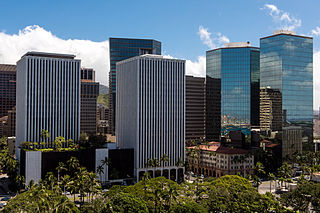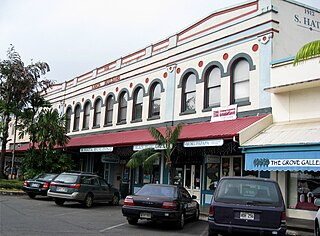
Charles Reed Bishop was an American businessman, politician, and philanthropist in Hawaii. Born in Glens Falls, New York, he sailed to Hawaii in 1846 at the age of 24, and made his home there, marrying into the royal family of the kingdom. He served several monarchs in appointed positions in the kingdom, before its overthrow in 1893 by Americans from the United States and organization as the Territory of Hawaii.

Downtown Honolulu is the current historic, economic, and governmental center of Honolulu, the capital and largest city of the U.S. state of Hawaii. It is bounded by Nuʻuanu Stream to the west, Ward Avenue to the east, Vineyard Boulevard to the north, and Honolulu Harbor to the south. Both modern and historic buildings and complexes are located in the area, with many of the latter declared National Historic Landmarks on the National Register of Historic Places.

Kakaʻako is a commercial and retail district of Honolulu, Hawaiʻi between Ala Moana near Waikīkī to the east and downtown Honolulu and Honolulu Harbor to the west. Kakaʻako is situated along the southern shores of the island of Oʻahu, Hawaii.
The Arts District is a neighborhood in Honolulu located west of downtown Honolulu's Hawaii Capital Historic District and on the eastern edge of Chinatown. It spans just over 12 blocks, bounded by Bethel and Smith Streets and Nimitz Highway and Beretania Street.

The Stangenwald Building at 119 Merchant Street, in downtown Honolulu, Hawaii was the city's first high-rise office building, with its own law library, and one of the earliest electric elevators in the (then) Territory when it was built in 1901. It was also advertised as "fireproof" because it was built of concrete, stone, brick, and steel, with no wood except in the windows, doors, and furniture, and because it had fireproof vaults and firehoses on every floor. Fireproofing was an important selling point because of the fire that had devastated nearby Chinatown the previous year.) Apart from a few exceptional structures like Aloha Tower (1926) and Honolulu Hale (1929), it remained the tallest building in Honolulu for half a century, until the building boom of the 1950s.

The Main Street Historic District in Fort Atkinson, Wisconsin, United States, was placed on the National Register of Historic Places in 1984. The district is composed of 51 buildings on or within a block of Main Street.

Kapālama, now often called Pālama, is a neighborhood of Honolulu, Hawaii. It is often combined with the adjacent Kalihi and referred to as a single entity, Kalihi–Pālama.
Charles William “C.W.” Dickey was an American architect famous for developing a distinctive style of Hawaiian architecture. He was known not only for designing some of the most famous buildings in Hawaiʻi—such as the Alexander & Baldwin Building, Halekulani Hotel, Kamehameha Schools campus buildings—but also for influencing a cadre of notable successors, including Hart Wood, Cyril Lemmon, Douglas Freeth, Roy Kelley, and Vladimir Ossipoff.

The Merchant Street Historic District in Honolulu, Hawaii, was the city's earliest commercial center.

The S. Hata Building is a historic structure in Hilo, Hawaii built by Japanese businessman Hata Sadanosuke in 1912. It now contains specialty shops, professional offices, and a Cafe Pesto restaurant.

The Chinatown Historic District is a neighborhood of Honolulu, Hawaii, known for its Chinese American community. It is one of the oldest Chinatowns in the United States.

The Hudson Downtown Historic District is a historic district comprising the downtown area of the city of Hudson in westernmost Lenawee County, Michigan. It was designated as a Michigan Historic Site on January 21, 1974. It was later added to the National Register of Historic Places on December 24, 1974.

Central Office Building is a historic building located in downtown Davenport, Iowa, United States. It has been individually listed on the National Register of Historic Places since 1983. In 2020 it was included as a contributing property in the Davenport Downtown Commercial Historic District. It is located in the center of a block with other historic structures. It now houses loft apartments.

The Greenville Downtown Historic District is a commercial historic district located in Greenville, Michigan along Lafayette between Montcalm and Benton, along with the adjacent blocks of Montcalm, Grove, Cass, and Washington on either side. It was listed on the National Register of Historic Places in 2008.

The Alma Downtown Historic District is a commercial historic district in Alma, Michigan, roughly located along Superior Street between the Pine River and Prospect Avenue, and along State Street between Center and Downie Streets. Parts of the district were designated a Michigan State Historic Site in 1975, and the entirety was listed on the National Register of Historic Places in 2013. It contains 72 structures, primarily brick commercial buildings, ranging from one to three stories in height and dating from 1874 to the 1960s.

Goshen Historic District is a national historic district located at Goshen, Elkhart County, Indiana. The district encompasses 751 contributing buildings and 1 contributing site in the central business district and surrounding residential sections of Goshen. The town was developed between about 1840 and 1930, and includes notable examples of Italianate and Queen Anne style architecture. Located with in the district are the separately listed Elkhart County Courthouse and Goshen Carnegie Public Library. Other notable buildings include the Kindy Block (1881), Central Block (1882), Spohn Building (1909), Harper Block (1888), Noble Building, Jefferson Theater (1907), General Baptist Church (1859), First Methodist Church (1874), and St. James Episcopal Church (1862).

The Constantine Historic Commercial District is a primarily commercial historic district located in Constantine, Michigan along Washington Street between Second and Water Streets, and along Water Street between White Pigeon Street and 125 West Water. It was listed on the National Register of Historic Places in 1985.

The 'Ionia Downtown Commercial Historic District is a primarily commercial district located roughly along West Main and Washington Streets, from Dexter Street to Library Street, in Ionia, Michigan. The district was listed on the National Register of Historic Places in 1984.

The Pontiac Commercial Historic District is a primarily commercial historic district located roughly along East Huron and South Saginaw Streets, within loop of Wide Track Drive, in Pontiac, Michigan. The core of the district, within the block bounded by Saginaw, Lawrence, Pike, and Wayne Streets, was originally listed on the National Register of Historic Places in 1984. A boundary increase creating the present boundaries was listed in 1989. The district includes the Eagle Theater and the Grinnell Brothers Music House, also listed on the National Register.


















